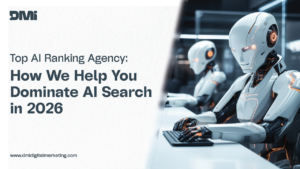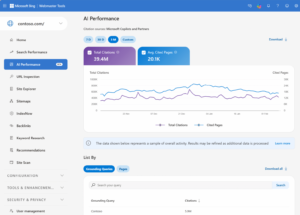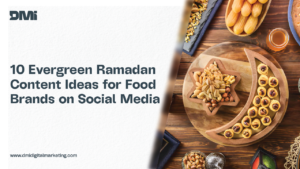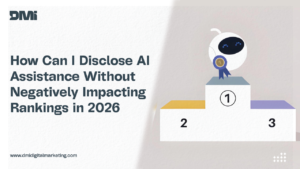Jump to Section
ToggleIs Artificial Intelligence (AI) still just hype or have we quietly crossed that line? AI now powers some of the biggest shifts in marketing and content strategy. Google’s zero-click search is a perfect example. From blog creation and email personalization to optimizing full customer journeys, AI is rewriting the rules.
But with innovation comes tension. And the tension hasn’t waned for AI adoption. Should marketers/content creators lean on AI for efficiency or pull back to avoid sounding robotic? Can AI personalize at scale without crossing into “creepy”?
To cut through the noise, we’ve curated 20 quotes from CMOs, founders, and thought leaders, paired with brief reflections and takeaways that reveal not just what they’re saying, but how their insights fit into timeless ethical business and work decisions.
AI + Human Creativity: A Partnership, Not a Replacement
-
“The future of AI isn’t human vs. AI—it’s human with AI.” – Kipp Bodnar, CMO Hubspot, (Source: HubSpot)
-
“AI tools should complement, not replace human creativity.” – Chad Gilbert, VP of Content Marketing, NP Digital (Source: Neil Patel Blog)
-
“The more reliant marketers become on AI to produce content, the less differentiated that content will feel, which will put a premium on higher quality research and writing.” – Brad Wolverton, HubSpot’s Senior Director of Content (Source: HubSpot)
-
“AI won’t replace humans, but humans with AI will replace humans without AI.” Karim Lakhani, Professsor at Harvard Business School (Source: HBR)
-
“AI is not a threat to content marketing but a powerful tool that, when used thoughtfully, can enhance human creativity and strategic capabilities. The most successful marketers will be those who learn to seamlessly integrate AI technology while maintaining the irreplaceable human touch.” Angeley Mullins Forbes Council member (Source: Forbes).
-
“AI is just the latest in a long line of technologies that promises human-like interactions with the efficiency and accuracy of robots. But like the technologies before it (automated phone menus, voice recognition, Clippy, etc.) it will be years before the interactions can pass the human sniff test. Amidst all the noise about AI, there will be a population of marketers that leans into humanity to make real connections with their fellow humans.” Jason Tsai, CMO at Captify (Source: The CMO Club)
Commentary
I can say this is one of the themes I always come across on AI talks: AI can only help, but would never replace humans. One of the biggest mistakes you can make is treating AI as a shortcut to avoid the work of thinking, researching, or storytelling, forgetting that AI is a machine that can produce incorrect information. But look at how the best companies are using it:
HubSpot uses AI to generate content drafts, but relies on its human writers to incorporate brand tone and conduct original research.
Neil Patel’s team at NP Digital use AI primarily for initial drafts, to save time, but the final pieces are heavily edited by human writers for clarity.
When companies copy-paste AI outputs, they produce bland, undifferentiated content that no one remembers (and Google often downranks such contents).
Takeaway: Use AI as your assistant in brainstorming, structuring, and handling repetitive tasks. Do this, so you can free up more time to do what machines can’t, such as in-depth storytelling technique, original insights, and emotional resonance.
Further Reading: 2 Years On: 5 Everyday Use Cases of Gen AI Tools in Content Writing,
AI and Personalization
7. “The state of marketing personalization is at a macro level. We can do better. AI can enable individualization of every journey.” Sandie Young former director of Marketing at Ready North (Source: Marketing AI Institute)
8. “Integrating AI into a well structured content supply chain can help brands achieve hyper-personalization at scale while maintaining consistency and quality.” (Source: Forbes Tech Council)
9. “No, I do not believe robots will replace marketers. But I do believe we can leverage AI and machine learning to evolve our messaging and visuals more quickly, particularly within digital media placements. By leveraging these tools, marketers can personalize, optimize, and tailor marketing messages to specific audience segments, leading to higher engagement and conversion rates—as well as deeper brand affinity because you can reach only the most relevant people for your business with the most relevant messages and imagery.” Christina Kozloff, CMO at Plenty of Fish. (Source: The CMO Club)
Commentary
Marketers have been talking about and looking for ways to incorporate “personalization” in their marketing strategies for a long while now and AI is finally making it possible in the simplest way.
Think:
Netflix recommends exactly what you want before you even search.
Spotify curates playlists that feel eerily accurate.
Amazon showed you products you didn’t know you wanted but ended up buying.
The same applies to email campaigns, landing pages, and content recommendations. AI can analyze micro-signals based on your previous behaviors (such as which blog posts someone clicks, how long they spend reading, and even which subject lines they open) to tailor experiences that feel custom-built for each person.
But what is the limitation? Bad personalization is worse than no personalization. If your AI makes poor recommendations or pushes irrelevant content, it can break trust.
Takeaway: Use AI to drive relevance and timeliness, but layer in ethical guidelines, avoid being invasive, protect privacy, and always test messaging against human intuition.
AI and SEO
10. “Brands that use AI have a serious competitive advantage over those who don’t. They write better content that ranks higher in far less time than others in their match.” Jeff Coyle co-founder & chief product officer MarketMuse (Source: Marketing AI Institute)
11. “If you see AI as an essential way to help you produce content that is helpful and original it might be useful to consider if you see AI as an inexpensive easy way to game search engine rankings then no.” Danny Sullivan- founder Search Engine Land (Source: Search Engine Roundtable)
12. “If you want to use AI to help create your content by all means go ahead. But I recommend that you heavily modify it.” Neil Patel co-founder NP Digital (Source: Neil Patel blog)
Commentary
SEO is where AI both shines and gets misused. AI tools can generate content outlines, keyword lists, and draft articles faster than any human writer. But speed alone is not enough, the strategy matters.
Here’s the shortfall: Google is getting better at detecting AI spam content. AI contents are mostly thin, repetitive, keyword-stuffed articles with no originality making them quite easy to detect.
What ranks today is E-E-A-T content (Expertise, Experience, Authoritativeness, and Trustworthiness).
How do you achieve that by combining AI speed with human depth:
- Let AI do the keyword research and draft outlines.
- Layer in your expertise, brand stories, customer case studies, and unique insights.
- Utilize AI to identify gaps and optimize your structure, but never outsource your authority.
Takeaway: AI can help you win on Google, but only if you treat it as a co-pilot, not the driver.
Read More: Human Touch vs. AI Precision: Writing Content in the Generative Artificial Intelligence Era
The Future of AI in Marketing
13. “AI is going to commoditize and disrupt so many businesses the way to prevent that is to be very bold and move forward to embrace AI as quickly as possible” Kipp Bodnar HubSpot’s chief marketing officer (Hubspot)
14. “Generative AI is here, and we need to steer it in the right direction to reach its potential. I hope that we as creators and marketers and business leaders will take the reins of this technology and bend the area of its use towards something positive.” Meghan Keaney Anderson Jasper’s VP of Marketing (Hubspot)
15. “Technology is both a blessing and a curse. You cannot talk about marketing technology and not talk about AI.’ Pam Didner B2B and Tech Consultant (Marketing AI Institute)
16. “Instead of dwelling on the anxieties, you need to harness the positive aspects of AI technology. There is no doubt that AI can benefit many, if not all, digital marketers in some capacity”. Neil Patel co-founder NP Digital (Neil Patel blog)
Commentary
AI is not “coming”, it’s here! The real divide in the next five years will be between companies that adapt quickly and those that get left behind. Look at what happened with:
Social media adoption
Between the year 2008–2012 companies that moved fast e.g., Nike, and Starbucks built massive online communities early.
Mobile optimization
2013–2016 early movers doubled engagement while latecomers lost visibility.
Video-first marketing
Brands that jumped on TikTok and YouTube Shorts within the year 2018–2021 gained audiences that competitors couldn’t reach.
Takeaway: Don’t wait for a “perfect use case.” Start experimenting today. Whether it’s AI-driven chatbots, predictive analytics, or content optimization. Early adopters will set the rules.
AI in Content Creation
17. “AI will help power your content supply chain, but people should lead by creating original content and setting a strategy to mix, match and deliver it.” Mathew Lieberman CMO at PwC (Source: Forbes).
18. “The first way to change the game for content creation is by setting up a custom AI agent for your brand. This entails the collection of all relevant content and exposing the AI to activities such as opinion generation, message writing and pattern identification.” Waleed Najam CEO NEO Innovations (Source: Forbes)
19. “Use it to write your content. Focus your energy on editing and making sure that your content is accurate and relevant for you and your audience. What I’m really saying is: invest in a good editor that understands your brand voice.” Aub Wallace co-founder of Dandelion Branding (Source: The CMO Club).
20. “The marketing industry will really begin to take advantage of opportunities to save time through AI-generated content development and create more meaningful moments with customers through quality and timely customer service.” Alexander Bjertnaes chief strategy officer at MeltWater (Source: The CMO Club)
Commentary
With these quotes, it’s glaring that AI is changing the game when it comes to content creation. It’s like having a super-smart assistant that can help you brainstorm ideas, produce content outlines, and even write entire drafts in no time.
However, here’s the thing: AI might be intelligent, but it’s not renowned for creativity or emotional depth. That’s where human writers come in. By teaming up with AI, you can use its powers to save time and boost productivity, while still bringing your unique perspective and human touch to the table. Think of AI as your trusty intern/assistant, handling the ambiguity of your work so you can focus on other tasks, such as building customer relationships, clicking compelling stories, and connecting with your audience.
Takeaway: Don’t leave AI out in your content creation process. Use it to streamline your workflow, gain insights, and even generate ideas. But don’t forget to add your own special thing – you, your human intuition, creativity, and empathy. By combining the best of both worlds, you’ll be unstoppable.
FAQs
How is AI being used in marketing and content writing right now?
AI is doing everything from writing first drafts of blogs and social posts, to personalizing emails in real-time, to analyzing millions of data points for ad targeting. For example:
- HubSpot’s AI Assistant helps with social posts and campaign summaries.
- Jasper and Copy.ai generate ad copy variations instantly.
- Persado creates AI-optimized email subject lines that outperform those written by humans.
Will AI replace human marketers and content writers?
- No, but it will replace marketers who refuse to adapt. The winning model is “human + AI.”
- Humans: empathy, storytelling, creativity, brand voice.
- AI: speed, data crunching, personalization at scale.
- Think of AI as a junior copywriter who never sleeps, but still needs an editor.
What are the top benefits of using AI in marketing?
- Efficiency: Create drafts, outlines, and variations in minutes.
- Personalization: Deliver unique content to millions of users simultaneously.
- Predictive Analytics: Forecast customer behavior with accuracy.
- Scalability: Execute campaigns across dozens of platforms without burning out your team.
What are the risks of using AI in marketing?
- Bias: If your training data is biased, your recommendations will likely be biased as well.
- Over-automation: Customers notice when your messaging feels robotic.
- SEO Penalties: Google can de-rank low-quality AI spam.
- Trust issues: Over-personalization without consent can be perceived as creepy.
Can AI actually be creative?
AI is excellent at remixing patterns—it can draft poems, slogans, or even ad visuals. But it’s not original. It lacks lived experience, emotional depth, and cultural insight. That’s why the best use is AI + human editing, where humans bring nuance and relatability.
How do I get started with AI in marketing?
- Pick one tool (Jasper, Copy.ai, Surfer SEO, etc.) and test it on a single campaign.
- Use these AI tools for low-stakes tasks first (ad copy, outlines, email subject lines).
- Build a workflow: AI drafts → Human editing → AI optimization → Publish.
- Track results—AI works best when you test, learn, and iterate.
Final Thoughts
These 20 quotes reveal one undeniable truth: AI is not here to take our jobs, it’s here to reshape them. Marketers who cling to “the old way” will struggle. Marketers who blend AI efficiency with human creativity will thrive.
The real advantage isn’t just using AI—it’s knowing how to use it responsibly, strategically, and creatively. The future of marketing is here, and those who master this balance will not only keep up, they’ll lead.
Author
-

Yusuf Mutiat Temitope is a result-driven content writer with years of experience in conversion-driven content writing. Mutiat writes on digital marketing to drive business growth, provide insights on trending topics for the audience, and increase customer engagement.
View all posts SEO Content Writer





